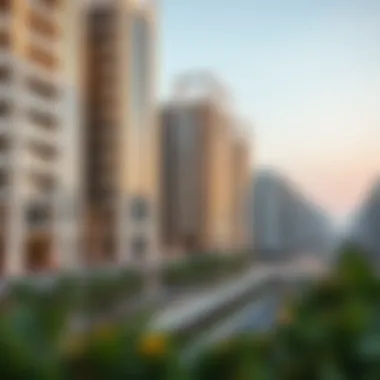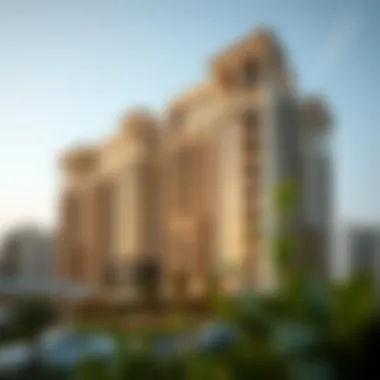The Rise of Residences in Dubai: Trends and Insights


Intro
Dubai has never been shy about showcasing its lavish lifestyles and remarkable architecture. The residential property market stands out as a significant highlight, reflecting broader trends, economic shifts, and cultural nuances of this dazzling city. Today, we will explore the mechanics behind the rise of residences in Dubai, bringing to light just what makes this market buzz with potential and opportunity.
In this article, we’ll take a closer look at current trends Steering the trajectory of the residential market, alongside practical investment guidance for those keen on tapping into these opportunities. By painting a clear picture of the property landscape in Dubai, we aim to empower investors, homeowners, and all stakeholders to navigate the waters ahead.
Market Insights
Current Trends in Dubai Real Estate
As Dubai moves towards a post-pandemic economic recovery, several trends have emerged within the residential property sector. A significant shift towards remote work has altered buyer preferences, prompting an influx of individuals from abroad seeking a tranquil yet vibrant lifestyle. Properties featuring home offices, outdoor spaces, and community amenities are now in high demand. In addition, the growing interest in sustainable living has led many developers to incorporate green building practices, enhancing the appeal of their projects.
Another emerging trend is the shift towards off-plan properties. While many buyers traditionally favored ready-to-move-in homes, there appears to be a growing appetite for newly constructed offerings. This trend can be attributed to competitive pricing, modern design features, and the potential for customization, making it an appealing option for many buyers.
Analysis of Property Prices and Forecasts
The property prices in Dubai have adjusted markedly over the past few years, which can be likened to a rollercoaster ride. The overall average prices have started to rise again after a period of decline. Insights from market analysts indicate that demand will likely surpass supply in the coming years.
To break it down further, here are a few key takeaways regarding current property prices:
- Price Rebounds: Average property prices have jumped by over 20% compared to previous years, particularly in prime locations like Dubai Marina and Downtown Dubai.
- Rental Increases: Rental yields are also improving, now averaging around 6-7%, attracting investors who are on the lookout for lucrative opportunities.
- Forecast: Experts anticipate further increases in property prices, influenced by a recovering economy and an uptick in tourism, especially as events, like Expo 2020, boost global interest in the city.
"Dubai's real estate market is witnessing a renaissance, driven by shifting consumer preferences and a growing economy," says Ahmed Al-Mansoori, a renowned property consultant.
Arming yourself with this market knowledge can serve as a potent tool for grasping the nuances of buying and investing in properties in Dubai.
Foreword
In recent years, the residential property sector in Dubai has blossomed almost overnight, evolving from a mere patchwork of developments into a dynamic and thriving marketplace that attracts global attention. The vibrancy of Dubai's housing market is not merely a reflection of its architectural grandeur, but rather an intricate tapestry woven from economic factors, cultural shifts, and the diverse needs of its residents. This article aims to unpack this intricate landscape, providing essential insights into the trends and opportunities that define the rise of residences in this flourishing city.
Contextualizing Dubai's Housing Market
To understand the housing market in Dubai, one must first grasp the unique context that shapes it. Dubai is not just a city; it’s a melting pot, buzzing with a mix of cultures and ideas. As expatriation flourishes, so does the demand for varied residential options. Whether you're looking for a cozy apartment in Jumeirah or a luxury villa in Palm Jumeirah, the offerings are as diverse as the people inhabiting them. The advent of world-class infrastructure, combined with government initiatives fostering investment, creates an ecosystem where residential projects thrive.
One pivotal element is the strategic vision of the rulers, who perceive real estate as a vital pillar for economic growth. For instance, the Dubai Vision 2021 aims to position the city as a top global destination, elevating residential development as a cornerstone of this ambition. Coupled with a favorable climate and geographical advantage, these factors turn Dubai's housing market into an appealing allure for both investors and new homeowners.
Significance of Residential Growth
The growth of the residential sector in Dubai plays a crucial role in multiple facets of the city’s overall development. First off, it’s a catalyst for economic prosperity. As the population swells, so does the construction sector, positively impacting employment rates and stimulating the economy through various ancillary industries like retail, hospitality, and services.
Moreover, as more people flock to the city, there’s a palpable shift in the demographic landscape, posing new challenges and opportunities alike. Younger generations have become influential in defining housing trends; they seek innovative designs and sustainable living spaces that reflect their values. This shift necessitates a responsiveness from developers, equipping them not just to meet current demands but also to anticipate future trends.
"Understanding the evolution of housing preferences is like reading a crystal ball; it offers insights into the future of community living."
The realities of a thriving residential sector extend beyond numbers and growth rates. They encompass the very essence of what makes Dubai attractive as a destination for living and investment. Hence, examining the rise of residences goes beyond just observing architecture; it necessitates a deeper dive into the socio-economic currents that shape this ever-evolving city.
Historical Overview
Understanding the historical context of Dubai's real estate market is key to appreciating its current dynamics and future predictions. The evolution of residential properties in this emirate is not just about the bricks and mortar; it reflects broader socio-economic trends, cultural shifts, and changing lifestyle preferences. Analyzing this history enables potential investors, homeowners, and real estate professionals to grasp the intricacies of the market and to navigate it more effectively.
Evolution of Property Development
Dubai's property development has come a long way since the 1980s when it was largely undeveloped desert. Initially, the focus was on basic housing structures, but by the late 1990s, a transformation occurred. As the city positioned itself as a global hub for tourism and business, skyscrapers and luxurious villas started to define the skyline.
- In 2002, the introduction of foreign ownership laws marked a significant milestone. This change fueled a surge in interest from international buyers, leading to an influx of investment.
- Significant projects such as the Burj Khalifa and Palm Jumeirah showcased Dubai's ambition and set the stage for further luxury developments. Homebuyers were no longer just looking for shelter; they craved lifestyle choices that included seafront properties with breathtaking views and world-class amenities.
- The introduction of freehold properties allowed for diverse cultural exchanges, attracting expatriates from all corners of the globe, further enriching the market.
This evolution is characterized by a shift from utilitarian housing solutions to more elaborate, community-focused developments. The rise of neighborhoods like Dubai Marina and Downtown Dubai signify this transition. Each project has increasingly been designed not just to house people, but to cultivate a sense of belonging by offering parks, shopping, and recreational options right at residents’ doorsteps.


Economic Factors Influencing Growth
Economic conditions are at the heart of Dubai's spectacular property surge. The interplay between global economic factors and local initiatives plays a critical role in shaping the housing market.
- Oil Prices: Historically, fluctuations in oil prices have significantly impacted Dubai's economy. While it has diversified its revenue streams, the oil sector still plays a pivotal role, influencing government spending and consequently, real estate development.
- Tourism Growth: Dubai’s strategic investment in tourism has been staggering. The Expo 2020, for example, was anticipated to boost residential demand by drawing millions of visitors. This kind of event catalyzes real estate growth not only through direct construction but also by enhancing infrastructure, which leads to long-term value appreciation.
- Government Incentives: Policies aimed at increasing foreign direct investment have been effective. The government's initiatives, such as long-term visas for property investors, cultivate a climate where buying becomes an attractive option for many expatriates, thereby expanding the market's base.
- Interest Rates: The economic policy set by the Central Bank of the UAE greatly impacts financing options for potential homeowners. While current interest rates are relatively low, maintaining competitive borrowing costs encourages home purchases, enhancing market growth.
Understanding these economic touchstones enables potential buyers and investors to forecast market trends and make informed decisions.
"Dubai’s real estate journey is a living testament to the resilience of a city that has continually redefined its identity on the global stage."
The historical overview encompasses these evolutionary steps and economic influences, providing a solid foundation for comprehending the residential market's complexities in Dubai. Recognizing these dynamics allows stakeholders to engage more meaningfully with the current market trends, ultimately enabling wiser investment choices.
Market Trends
The real estate market in Dubai is a vibrant field, constantly shifting to accommodate the varied needs of its diverse population. Understanding market trends is essential not only for investors but also for homeowners and agents to grasp the direction in which the market is heading. This section sheds light on several critical trends shaping Dubai's residential property landscape. Here, we’ll dig deep into emerging neighborhoods, shifts in buyer preferences, and the tangible impacts of global events on the local market.
Emerging Neighborhoods
Dubai’s skyline is a testament to innovative design and breathtaking architecture, but beneath that glitzy surface lies an evolving tapestry of residential neighborhoods. Regions like Dubai Marina, Al Furjan, and Jumeirah Village Circle have become hotspots for real estate development in recent years.
- Dubai Marina continues to attract investors seeking waterfront properties. Its luxurious highrises draw expatriates and locals alike, enjoying proximity to beaches and leisure facilities.
- Al Furjan is gaining attention for its community-centric design, appealing to families looking for a suburban feel while still remaining connected to the city.
- Jumeirah Village Circle offers affordable housing options amidst lush greenery, perfect for young professionals and first-time buyers.
These emerging neighborhoods are significant as they provide a wider selection of housing, catering to the diverse demographics of Dubai. Investors are keen on identifying these trends early to capitalize on potential growth. As regions continue to develop, the accompanying infrastructure, such as schools and shopping centers, enhances livability, further driving demand.
Shifts in Buyer Preferences
Gone are the days when buying property in Dubai meant opting for the flashiest option available. Today’s buyers have become more discerning about their choices. There’s a noticeable shift towards sustainability and community-focused living environments. Many prospective homeowners now prioritize factors such as:
- Eco-friendliness about building materials and designs. The concept of green living is no longer a luxury but a necessity for many.
- Smart home technology that lets residents manage their environments with ease—think automated lighting and smart security systems.
- Proximity to public transport, as more buyers seek convenience over excessive space.
This shift is reshaping how developers approach new projects, promising innovation in design that meets the expectations of today’s market. It’s a chance for investors to align with these preferences, ensuring their offerings are marketed effectively to attract this evolving clientele.
Impact of Global Events
The global economic climate significantly influences real estate trends in Dubai. Events such as the COVID-19 pandemic have had far-reaching effects on buyer behavior and market dynamics. Initially, there was a dip in demand as uncertainty loomed, but the market has since bounced back due to several factors:
- Increased remote work, leading many expatriates and locals to reconsider their living arrangements. Many are opting for larger homes outside bustling urban centers.
- Safety and health have taken center stage, causing a preference for residential units with private outdoor space or community amenities that support social distancing.
- Investment migration programs have caught the attention of wealthy individuals looking for safety and stability amid global turmoil. Programs aimed at golden visas have made Dubai an attractive destination for foreign investors.
The ripple effects of these global events underscore the resilience of Dubai’s housing market. It’s crucial for buyers and investors to remain agile and anticipate how such events can reshape both short- and long-term trends.
"Staying ahead of these shifts is key to navigating the intricacies of Dubai's real estate landscape."
Understanding these trends is pivotal for those looking to invest or reside in Dubai. By keeping an eye on the market’s pulse, stakeholders can make informed choices that align with their goals, whether that's buying a family home or investing in the next big development.
Investment Opportunities
Investment opportunities in Dubai’s residential housing market present a landscape filled with potential and profit. As the city continues to develop, the appeal for various types of properties remains strong. Understanding the intricacies of these opportunities is vital for investors, homeowners, and developers alike. The constantly shifting dynamics of the market for residences in Dubai make it essential for stakeholders to stay informed about what can lead to viable investments.
High-Rise Living vs. Low-Density Housing
The choice between high-rise living and low-density housing can greatly influence the investment strategy. High-rise properties, found predominantly in areas like Dubai Marina and Downtown Dubai, often cater to a cosmopolitan lifestyle. They attract expats and young professionals looking for convenience and quick access to amenities. These buildings typically offer:
- Spectacular views of the skyline and waterways, which can significantly drive demand.
- Amenities such as gyms, pools, and concierge services that enhance lifestyle appeal.
- Short-term rental potential, especially through platforms like Airbnb, due to their location.
On the other hand, low-density housing, often reminiscent of suburban living, draws a different segment of buyers. In communities like Arabian Ranches, residents benefit from:
- Family-friendly environments, often with larger living spaces and gardens.
- Close-knit community feel, which many expats look for when settling down.
- Lower price points, making it attractive for first-time buyers.
Ultimately, the decision comes down to personal preference and investment goals. High-rise might promise quicker returns and higher rental income, while low-density options often provide stability and long-term appreciation.


Financing Options
Navigating the financing landscape in Dubai can feel daunting, yet it is worth exploring the avenues available. Here are key financing options for prospective investors:
- Mortgage options through local banks: Many local banks offer attractive mortgage rates for property buyers, especially for first-time homeowners. These often range from fixed to variable rates, customizable to meet individual needs.
- Installment plans offered by developers: With many developers looking to entice buyers, installment plans allow purchasers to pay in phases. This often gives the buyer time to secure financing without excessive upfront burdens.
- Islamic financing: Sharia-compliant financing options are also available. They operate differently from conventional mortgages, allowing for ethical investment methods in accordance with Islamic principles.
Understanding these options helps investors to devise a clear financial strategy, ensuring they can comfortably step into the vibrant Dubai property market.
Rental Market Dynamics
The rental dynamics in Dubai are multifaceted and merit careful exploration. A few essential points easily stand out:
- High rental demand: Dubai is recognized as a global hub which attracts a constant influx of expatriates and professionals seeking temporary residences. This results in consistent rental income for landlords, especially in sought-after locations.
- Seasonal fluctuations: While demand is generally high, it's notable that certain periods, such as summer and local holidays, can lead to shifts in rental prices. Investors need to be cognizant and prepared for these trends.
- Regulatory changes: Recent government initiatives, including rental cap measures and regulations for tenant rights, can greatly influence the rental market. Investors must stay updated on these developments, as they might affect their profitability.
Regulatory Landscape
The regulatory landscape plays a pivotal role in shaping the residential real estate market in Dubai. Understanding this framework is vital for stakeholders, including investors, homeowners, and developers, as it impacts investment decisions, property values, and market stability. In a bustling city like Dubai, where the real estate sector is constantly evolving, regulations help to establish order and ensure a level playing field.
The significance of regulatory clarity extends beyond just legal compliance. With the government actively implementing policies to promote sustainable development and foreign investment, potential buyers can navigate the market more confidently. Such regulations also encourage a transparent atmosphere that protects the rights of property owners and tenants, fostering trust in the real estate ecosystem.
Government Initiatives and Policies
Dubai's government has undertaken several initiatives aimed at enhancing the residential property market. One notable initiative is the Dubai Urban Master Plan 2040, which lays out a visionary framework for urban development. This ambitious plan focuses on creating diverse and integrated communities while balancing urban expansion with sustainability. Key components of this initiative include:
- Sustainable Communities: Prioritizing greenery, open spaces, and community centers.
- Mixed-Use Developments: Encouraging a blend of residential, commercial, and recreational spaces.
- Accessibility: Improving public transport networks to enhance connectivity.
These policies reflect the government’s commitment to promoting quality living environments and making Dubai an attractive destination for expatriates and local residents alike. This kind of foresight can lead to increased property values and a flourishing real estate ecosystem.
Impact of Foreign Ownership Laws
Foreign ownership laws have defined the landscape for residential investments in Dubai. The introduction of 100% foreign ownership in certain areas has opened new doors for international investors. This regulation has significantly influenced property purchasing trends, providing a considerable incentive for overseas individuals and corporations to explore opportunities in the emirate.
While this liberalization of ownership has its perks, it also comes with certain considerations. Foreign buyers must be aware of specific areas where they can purchase property versus zones that are restricted. Understanding these stipulations is crucial for making informed investment decisions. Moreover, these laws contribute to the overall stability of the market, as they help mitigate risks associated with speculative buying, encouraging genuine investments that support local economies.
For further information on Dubai's regulatory framework and housing initiatives, consider exploring resources such as Dubai Land Department and Government of Dubai.
Lifestyle Considerations
Understanding lifestyle considerations is critical when navigating the residential real estate market in Dubai. The choices individuals make about where to live are deeply intertwined with their lifestyles, which include preferences for space, amenities, community environments, and cultural influences. This section will examine how these elements shape the living experience in this vibrant city, ultimately driving decisions for investors, homeowners, and expatriates alike.
Amenities and Community Features
In Dubai, amenities are not just mere add-ons; they are often the core selling point for residences. When potential homeowners or investors evaluate properties, they increasingly prioritize well-thought-out community features. These can range from state-of-the-art fitness facilities, sprawling parks, and swimming pools to educational institutions and healthcare services, all designed to enhance the quality of life within a community.
Key Points:
- Accessibility is Key: Properties that are close to amenities like cafes, supermarkets, and schools are generally more appealing. Being able to walk or take a short drive to these facilities saves time and fosters a sense of community.
- Quality Over Quantity: It's not just about having a lot of amenities; it's about having high-quality options. For instance, a community-oriented gym with personal trainers and group classes adds value to residences.
- Social Atmosphere: Shared spaces like gardens and lounges encourage interaction among residents, creating a sense of belonging. These collective spaces can manifest as vibrant hubs where neighbors mingle, fostering friendships.
In summary, prospective buyers are often influenced by community features that cater to their everyday needs and enhance their social lives.
Cultural Influences on Housing Choices
Cultural elements play a significant role in shaping preferences for housing in Dubai. As a melting pot of different cultures, Dubai draws in expatriates and locals alike, each bringing their unique views toward home life and living environments. Understanding these cultural nuances can offer significant insights into the housing market dynamics.
Considerations:
- Diversity of Preferences: Different nationalities have varied desires regarding amenities and aesthetics. For instance, Western expatriates may prefer open-plan living spaces, while many in the Asian community may lean towards more segmented rooms for privacy.
- Congregational Spaces: Many cultures prioritize communal areas for family gatherings. Properties that offer such spaces are often viewed more favorably. In a city like Dubai, which hosts numerous multi-generational families, this is particularly relevant.
- Home as a Reflection: For many, the home is a deep reflection of their cultural identity. Local design elements incorporated into modern architecture resonate with buyers, making them feel more connected to their roots while living abroad.


In essence, understanding cultural influences allows developers and agents to cater to diverse needs, making properties more attractive to a wider range of buyers.
Challenges in the Market
As the residential market in Dubai continues to thrive, it faces a slew of challenges that could impact its trajectory. Acknowledging these hurdles is crucial for anyone involved in the real estate sphere—be it investors, developers, or potential homeowners. We’ll dive into two significant challenges: market saturation concerns and the impacts of economic volatility, providing an overview designed for those looking to navigate this dynamic environment.
Market Saturation Concerns
While Dubai’s growth is often portrayed as pristine and ever-expanding, the reality is nuanced. The construction booms of the past decade have led to a spike in residential units across various districts. The concern today? It's not just the number of properties available but the potential for oversupply.
- Increased Supply without Corresponding Demand: In a rush to capitalize on the booming market, multiple developers have constructed high-rise buildings and luxurious villas. However, not every project has found its buyer. A surplus means some developers may need to adjust prices to lure in buyers, which can have a rippling effect on overall property values.
- Specific Areas Overpopulated: Areas like Dubai Marina and Downtown Dubai are increasingly witnessing an influx of new residences. While these neighborhoods have historically been popular, there's a point where too many options might compromise their desirability, creating a buyer’s market that can lead to price degradation.
- Long-Term Impacts on Investment: Investors aiming for appreciation may find themselves grappling with static or falling prices in oversaturated areas. The risk then shifts from price gain to long-term holding costs; a stark shift that necessitates deep market research.
"Successful investment in Dubai’s real estate requires a keen eye on both supply and demand trends. Those swept up in the excitement can easily overlook critical market signs."
Economic Volatility Impacts
Economic conditions have a way of shaking even the sturdiest foundations. Dubai, being part of the global economy, is not immune to fluctuations that can impact consumer perception and, ultimately, investment confidence.
- Global Uncertainties: Whether it's geopolitical tensions or fluctuations in oil prices, investors need to stay alert. For example, a dip in oil prices has ripple effects throughout the economy, affecting everything from consumer spending to expatriate migration patterns. Expatriates are often a driving force in Dubai’s housing market, so any dip in their numbers directly influences housing demand.
- Currency Fluctuations: The dirham is pegged to the US dollar, shielding it from certain forms of volatility. However, shifts in the US economy or fiscal policy can create a false sense of security, leading to unexpected volatility in the Dubai market. A weaker dollar can be an attractive proposition for foreign investment, but it can also deter local buyers, who may find purchasing power diminished.
- Increased Cost of Living: Economic downturns generally bring about increased living costs, which can deter potential buyers and impact rental rates. For those in the market for a home, a rise in living expenses can tighten the budget, shifting interest away from new purchases and towards more affordable housing.
Navigating the challenges in Dubai's residential market isn't a straightforward path. Stakeholders must be acutely aware of market saturation risks and the far-reaching effects of economic volatility. The key takeaway is simple: remain informed and adapt to the ever-shifting landscape.
Future Outlook
Understanding the future outlook of Dubai's residential market is paramount for a variety of stakeholders including homebuyers, investors, and real estate professionals. As this vibrant city continues to grow and diversify, recognizing the upcoming trends and potential challenges allows for more informed decision-making. The residential landscape is interwoven with both local and global dynamics. Thus, being aware of these shifts can highlight investment opportunities and inform strategic planning for various players in the field.
Predictions for Real Estate Trends
The pulse of the real estate market in Dubai often reflects larger macroeconomic conditions and shifts in consumer preference. Some likely trends for the coming years include:
- Increase in Affordable Housing: As the demand for real estate rises, there’s a growing emphasis on affordable housing solutions. Developers are realizing that catering not just to luxury segments, but also to middle-income earners will expand their customer base.
- Sustainability Focus: Environmental concerns are becoming a driving force. Future projects may prioritize eco-friendliness, with more energy-efficient buildings and developments incorporating green spaces.
- Integration of Smart Technology: Smart homes are expected to become increasingly prevalent. This could range from simple automation to integrated systems that optimize energy consumption and enhance security.
As we eye these trends, it is crucial for investors to be alert to fluctuations in demand and pricing. Moreover, strategic partnerships with local authorities and developers can present unique opportunities for those willing to adapt.
Impact of Technological Advancements
The influence of technology on the real estate sector cannot be overstated. From how properties are marketed to how they are managed, technological innovations are set to redefine residential living.
- Virtual Reality and Augmented Reality: These technologies allow potential buyers to experience properties remotely, greatly improving the viewing experience. Imagine touring a penthouse in Dubai from thousands of miles away, making decision-making for investors quicker.
- Blockchain for Transactions: This technology can potentially streamline buying and selling processes by reducing fraudulent activities and ensuring transparent transactions. It promises to simplify paperwork and cut down the time significantly.
- Big Data: Utilizing data analytics can enable developers to gather insights on buyer preferences, leading to tailored offerings that meet specific needs. This not only aligns with consumer desires but can boost sales rates.
Clearly, advancements in technology are reshaping how the real estate market functions. Those who embrace these changes stand to gain significant competitive advantages.
"Technological influences in real estate not only enhance operations but fundamentally change the nature of transactions and interaction between buyers and sellers."
Epilogue
In wrapping up this exploration of Dubai's residential landscape, it’s crucial to underscore the myriad of insights derived from our earlier discussions. Understanding the dynamics of this market is not just beneficial, it’s essential for stakeholders ranging from seasoned investors to first-time homebuyers.
Summarizing Key Insights
The growth trajectory of Dubai's residential properties is underscored by several key points:
- Rapid Population Growth: The booming population creates a sustained demand for housing, driving both development and rental markets.
- Diverse Investment Opportunities: From luxury apartments in Downtown Dubai to more affordable locales in areas like Jumeirah Village Circle, there’s a range of options suiting different budgets and investment strategies.
- Strong Regulatory Framework: Initiatives by the government aimed at making property ownership more accessible have enabled a more vibrant real estate scene.
The influx of foreign investors has not only invigorated market conditions but also spurred innovation within property development, setting a new standard for living in Dubai.
- Emerging Trends: Technological influences, sustainability concerns, and changes in buyer preferences towards community living illustrate the evolving tastes of home seekers.
Overall, the main takeaway is that the residential market in Dubai is not merely a sector of real estate; it’s a robust ecosystem that reflects broader social and economic shifts.
Encouraging Informed Investment Decisions
For anyone eyeing the Dubai housing market, making informed decisions cannot be emphasized enough. It’s about more than just picking a property; it’s about understanding the broader implications of your investment. Here are some considerations:
- Do Your Homework: Research neighborhoods and stay updated on emerging trends. Websites like Dubai Land Department can provide valuable information.
- Consult Experts: Connecting with real estate agents or investment consultants who know the ins and outs of Dubai’s market can save you time and money. They can offer advice tailored to personal goals.
- Consider Long-Term Value: Look beyond immediate needs; think about future growth. Properties in early-developing neighborhoods may yield higher returns over time as infrastructure improves.
- Regulatory Awareness: Keeping tabs on laws relating to property ownership, especially for expatriates, can prevent unnecessary hiccups down the road.







